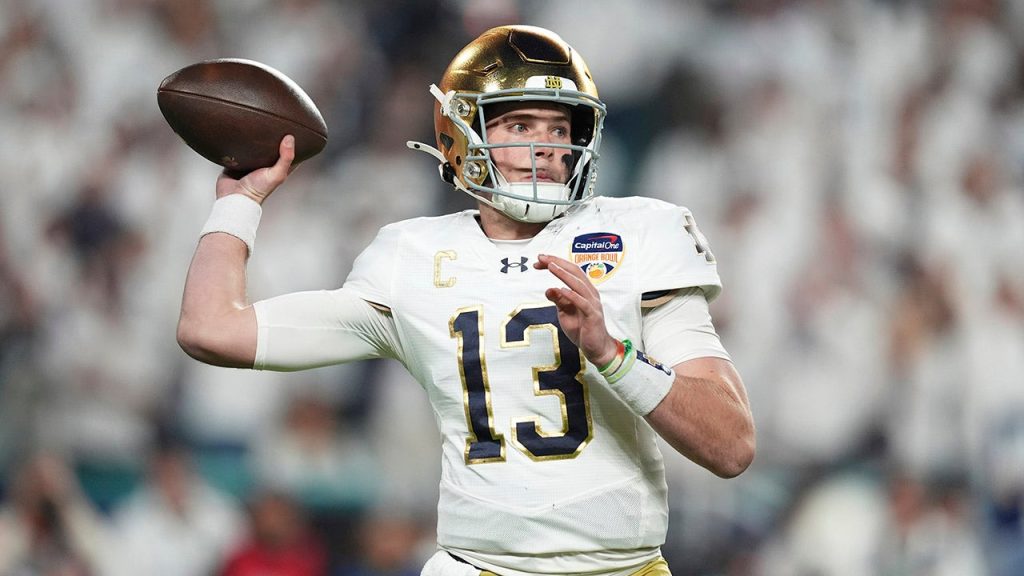Riley Leonard, the Notre Dame Fighting Irish quarterback, has consistently affirmed his deep-rooted faith throughout his college football journey, often attributing his team’s success to divine intervention. In the lead-up to the national championship game against Ohio State, Leonard expressed his conviction that both teams’ prominent displays of faith were the driving force behind their remarkable seasons, leading them to compete for college football’s ultimate prize. He suggested that a higher power orchestrated their paths to the championship, placing them on this grand stage for a specific purpose. This perspective, though deeply personal, reflects a broader trend in college sports where athletes openly express their religious beliefs and attribute their achievements to a higher power.
Leonard’s public pronouncements of faith are not isolated incidents but rather a consistent theme throughout the season, especially during the high-stakes College Football Playoff. Following Notre Dame’s semifinal victory over Penn State, Leonard attributed the team’s second-half turnaround to his trust in God’s plan. He stated that he surrendered to God’s will, expressing complete faith in the divine plan for his life and the team’s season. This public declaration of faith resonated with many, highlighting the role of religion in shaping athletes’ perspectives and motivations. It also sparked conversations about the intersection of faith and sports, a topic that often generates diverse opinions and interpretations.
His expressions of faith extend beyond personal reflection to encompass the entire team. Leonard emphasized that the entire Notre Dame offense shares this faith-based approach, believing in Jesus’ guiding hand throughout their season. This collective faith, he believes, has unified the team and fueled their drive towards the championship. It fosters a sense of shared purpose and strengthens team bonds, providing a common ground beyond the strategic aspects of the game. This spiritual dimension adds another layer to the team’s narrative, making their journey to the championship not just a sporting achievement but also a testament to their shared beliefs.
After Notre Dame’s triumphant victory over Georgia, which secured their place in the championship game, Leonard once again publicly acknowledged God’s role in the team’s success. He expressed gratitude to Jesus Christ, emphasizing that without divine intervention, neither he nor the team would have reached this pinnacle of collegiate football. This statement underscored the profound influence of faith on Leonard’s perspective, portraying his athletic achievements as part of a larger spiritual journey. It also highlights the importance of acknowledging the contributions of others, including a higher power, in achieving personal and collective goals.
Leonard’s open expression of faith aligns with a broader trend among athletes who view their sporting careers through the lens of their religious beliefs. This perspective is not unique to Leonard or Notre Dame but reflects a growing phenomenon in college and professional sports where athletes increasingly acknowledge the role of faith in their lives and athletic pursuits. This public display of faith often sparks discussions about the intersection of religion and sports, prompting reflection on the role of spirituality in shaping athletes’ motivations, values, and overall performance.
The story of Riley Leonard and the Notre Dame Fighting Irish transcends the realm of sports, offering a glimpse into the profound influence of faith on athletes’ lives. Leonard’s unwavering belief in God’s guidance serves as a testament to the power of faith in shaping personal narratives and inspiring athletic achievements. His public expressions of gratitude and trust in a higher power reflect a growing trend among athletes who openly embrace their religious convictions and attribute their successes to divine intervention. This intersection of faith and sports adds a compelling dimension to the narrative of athletic competition, reminding us that for many athletes, their sporting journey is deeply intertwined with their spiritual beliefs.

